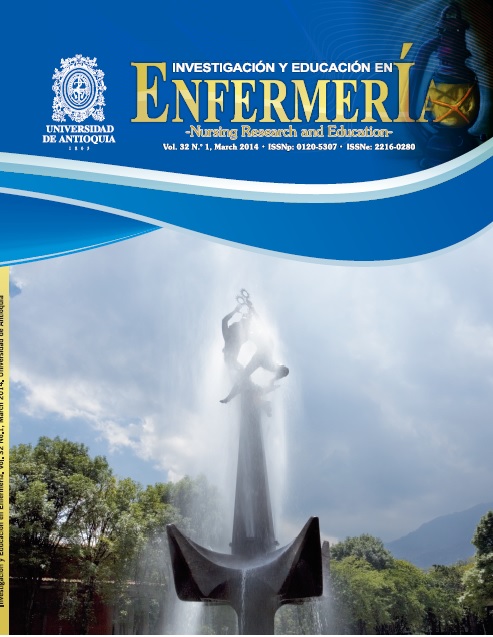Continuing education in nursing as a factor associated with knowledge on breastfeeding
DOI:
https://doi.org/10.17533/udea.iee.18613Keywords:
Breast feeding; education, nursing; health knowledge, attitudes, practice; family health.Abstract
Objective. Identifying the knowledge about breastfeeding of the nurses of the Family Health Program, and possible associations between the knowledge and personal, professional and self evaluation aspects.
Methodology. Observational and cross-sectional study conducted in family health units of a city in Minas Gerais, Brazil, with 85 nursing professionals. Data were collected through a questionnaire. We used the Student t-test for differences between means and Pearson correlation analysis.
Results. The mean score of the professionals on the knowledge test was 6.6 and was higher in the group that attended courses on breastfeeding.
Conclusion. There is a need for continuing education, providing reflective and critical mobilization, the questioning of reality and identification of users needs.
Downloads
References
(1) Brasil. Ministério da Saúde. Secretaria de Atenção à Saúde. Departamento de Atenção Básica. Saúde da criança: nutrição infantil. Aleitamento materno e alimentação complementar. Brasília; 2009.
(2) Venancio SI, Escuder MM, Saldiva SR, Giugliani ER. Breastfeeding practice in the Brazilian capital cities and the Federal District: current status and advances. J Pediatr. 2010; 86(4):317-24.
(3) Paim J, Travassos C, Almeida C, Bahia L, Macinko J. The Brazilian health system: history, advances, and challenges. Lancet. 2011; 377:1778-97.
(4) Caldeira AP, Fagundes GC, Aguiar GN. Educational intervention on breastfeeding promotion to the Family Health Program team. Rev Saude Publica. 2008; 42(6):1027-33.
(5) Fujimori E, Nakamura E, Gomes MM, Jesus LA, Rezende Ma. Aspectos relacionados ao estabelecimento e à manutenção do aleitamento materno exclusivo na perspectiva de mulheres atendidas em uma unidade básica de saúde. Interface. 2010; 14(33): 315-27.
(6) Lundberg PC, Ngoc Thu TT. Breast-feeding attitudes and practices among Vietnamese mothers in Ho Chi Minh City. Midwifery. 2012; 28(2):252-57.
(7) Ciconi RCV, Venancio SI, Escuder MML. Knowledge assessment of Family Health Program teams on breast feeding in a Municipality of São Paulo's Metropolitan Region. Rev Bras Saúde Matern Infant. 2004; 4(2):193-202.
(8) Caldeira AP, Aguiar GN, Magalhães WAC, Fagundes GC. Knowledge and practices in breastfeeding promotion by Family Health teams in Montes Claros, Brazil. Cad Saúde Pública. 2007; 23(8):1965-70.
(9) Silvestre PK, Carvalhaes MABL, Venancio SI, Tonete VLP, Parada CMGL. Breastfeeding knowledge and practice of health professionals in public health care services. Rev Lat-Am Enfermagem. 2009; 17(6):953-60.
(10) Chen CH, Chen JY. Breastfeeding knowledge among health professionals in Taiwan. Acta Paediatr Tw. 2004; 45(4):208-12.
(11) Szucs KA, Miracle DJ, Rosenman MB. Breastfeeding knowledge, attitudes and practices among providers in a medical home. Breasfeed Med. 2009; 4(1):31-42.
(12) Bueno LGS, Teruya KM. Aconselhamento em amamentação e sua prática. J Pediatr. 2004; 80(Suppl 5):S126-S130.
(13) Becker D. No seio da família: amamentação e promoção da saúde no Programa de Saúde da Família [Dissertation]. Rio de Janeiro: Escola Nacional de Saúde Pública, Fundação Oswaldo Cruz; 2001.
(14) Marques ES, Cotta RMM, Franceschini SCC, Botelho MIV, Araújo RMA. Practices and perceptions about breastfeeding: consensus and dissensus in the daily care in a Family Health Unit. Physis. 2009; 19(2):439-55.
(15) Ingram J, Johnson D, Condon L. The effects of Baby Friendly Initiative training on breastfeeding rates and the breastfeeding attitudes, knowledge and self-efficacy of community health-care staff. Prim Health Care Res Dev. 2011; 12:266-75.
(16) Cantrill RM, Creedy DK, Cooke M. How midwives learn about breastfeeding. Aust J Midwifery. 2003;16(2):11-6.
(17) Ward KN, Byrne JP. A Critical Review of the Impact of Continuing Breastfeeding Education Provided to Nurses and Midwives. J Hum Lact. 2011; 27(4):381-93.
(18) Kronborg H, Varth M, Olsen J. Health visitors and breastfeeding support: influence of knowledge and self-efficacy. Eur J Public Health. 2008;18:283–88.
(19) Brasil. Ministério da Saúde. Secretaria de Gestão do Trabalho e da Educação na Saúde. Departamento de Gestão da Educação. Curso de formação de facilitadores de educação permanente em saúde: unidade de aprendizagem – práticas educativas no cotidiano do trabalho em saúde. Rio de Janeiro: Fiocruz; Brasília; 2005.
(20) Balbino AC, Maia TM, Rosa TCA, Silva FF, Cecon PR, Cotta RMM. Educação permanente com os auxiliares de enfermagem da estratégia saúde da família em Sobral, Ceará. Trab Educ Saúde. 2010; 8(2):249-66.
(21) Hellings P, Howe C. Breastfeeding knowledge and practice of pediatric nurse practicioners. J Pediatr Health Care. 2004;18(1):8-14.
(22) Anselmi ML, Duarte GG, Angerami ELS. Employment survival of nursing workers in a public hospital. Rev. Latino-am. Enfermagem. 2001; 9(4):13-8.
(23) Monteiro JCD, Nakano AMS, Gomes FA. O aleitamento materno enquanto uma prática construída: reflexões acerca da evolução histórica da amamentação e desmame precoce no Brasil. Invest Educ Enferm. 2011; 29(2): 315-21.
Published
How to Cite
Issue
Section
License
Derechos de propiedad / Direitos de Propriedade
English: If the article is accepted for publication, all copyright will be of exclusive property of Investigación y Educación en Enfermería. The text and the graphics included in the publication are exclusive responsibility of the authors and not necessarily reflect the thought of the Editorial Committee.
Español: Si el artículo es aprobado para publicación, todos los derechos son de propiedad de Investigación y Educación en Enfermería. El texto y las gráficas incluidas en la publicación son de exclusiva responsabilidad de los autores y no necesariamente refleja el pensamiento del Comité Editorial.
Português: Se o artigo for aceito para publicação, todos os direitos autorais serão de propriedade exclusiva de Investigación y Educación en Enfermería. O texto e os gráficos incluídos na publicação são de responsabilidade exclusiva dos autores e não refletem necessariamente o pensamento do Comitê Editorial.















